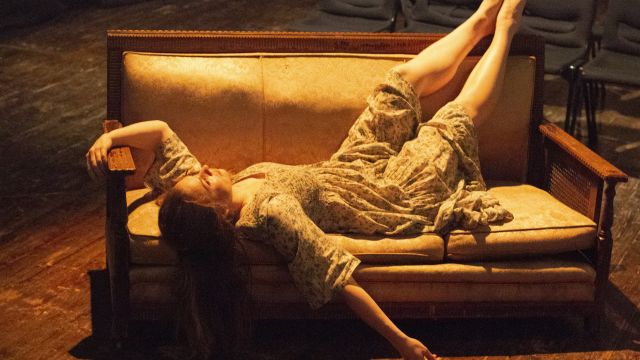A Room of One’s Own
Peta Hanrahan has made a theatrical adaptation for four actors of two lectures Virginia Woolf gave at the women’s colleges – Newnham and Girton – at Cambridge University in 1928 on ‘Women and Fiction’. In 1929, those lectures became the famous book. The premise is the famous line, ‘A woman must have money and a room of her own if she is to write fiction.’
As for Woolf herself, she pretty much always had a room of her own and by 1928 had published four novels. With her lectures, she used her prestige of speak on behalf of the thwarted, the blocked, the impecunious and thus wasted women of talent then and across history.
The current adaption is not the first of this text by Peta Hanrahan. The first was in 2016 at La Mama. Now she returns to the task of communicating, in theatrical form, things that, as she tells us in her program note, mean an enormous amount to her both professionally and personally. Hearing her forceful cast perform the text, one understands even more why that is so.
And indeed, one would not want to quarrel with Woolf’s dissertation per se: it is beautiful flowing evocative prose, it is eloquent, witty, barbed, ironic and wears its erudition lightly. Just as important, it raises salient questions still pertinent today. Such as, how many women’s talents are blocked and constrained by circumstance – economic or otherwise - or just by men? Why do male authors idealize women in their writing and yet the male world continues on its misogynist way? Why are male critics so vehement in their attacks on women’s writing – or indeed on women themselves? Or, to put that last question more crudely than Woof asks it, why do men hate women? I hoped for an answer to that last question, but Woolf – albeit usefully – only raises it. An engrossing line of enquiry is opened up with the specific if fictional case of Shakespeare’s ‘sister Judith’. Woolf asks us to imagine a woman with the same talents as her famous brother – and then to imagine what would have happened to her. Will goes to school, ‘Judith’ does not. ‘Judith’ refuses an arranged marriage and so she is beaten. Will goes to London… And so on.

Ms Hanrahan divides Woolf’s text into four – as if the original were an internal to-and-fro dialogue made up of questions (some rhetorical), flights of fancy or tactful suggestion (‘what if…?’), observations (many wry – or bitter), and finally the intervention of the ‘real’ (male) world. My divisions here are possibly arbitrary and not all accurate, but then at times so is her adaptation.
Ms Hanrahan’s four characters are The Questioner (Anthea Davis), the Diplomat (Marissa O’Reilly), the Sceptic (Anna Kennedy) and The World (Jackson Trickett). These roles are precisely cast as to type and look – aided by Dagmara Gieysztor’s highly intelligent choice of costumes. The Questioner in severe black suit, the Diplomat barefoot, ‘feminine’ and non-threatening in full-length ‘floaty’ dress, the Sceptic bold, high-coloured and glamorous (i.e. threatening) in trousers and black top, and the World in surprisingly casual jeans and leather jacket. These costumes – that of The World much less so - make a large contribution to distinguishing the positions of the (sometimes over-lapping) points of view, aided by Paul Lim’s so subtle but effective lighting design.
The women themselves have great presence and impressively maintain their different ‘characters’ throughout – including their movements on stage. Anthea Davis is particularly fine here; her mode of questioning is sincere, absolutely clear and as if genuinely seeking answers. I confess to some uncertainty about Mr Trickett – although that’s no reflection on him as an actor. But as the representative of The World, he seems to me to be somewhat lacking in power and certainty and the three women on stage rather overwhelm his presence. His character’s contributions, though important to Woolf’s case, end up seeming like after-thoughts or even interruptions. This is puzzling since it is indeed part of Woolf’s case that the male world is no push-over.
(By the way, Ms Hanrahan’s adaptation is not the first. Patrick Garland adapted A Room of One’s Own as a one-woman show – later filmed – for Eileen Atkins in 1991.)
A Room of One’s Own is an intense experience. The cast and the text compel our close attention – and attention is essential because of the sheer density of the text. Virginia Woolf is an enormously influential (not to say cult) figure and her ideas in these lectures are rightly part of the feminist lexicon. The play is, nevertheless, a play of ideas, and there is no narrative spine on which to hang those ideas. Peta Hanrahan’s passion, talents and skills make this presentation theatrical, but is it theatre? Or is it a beautifully acted, designed and directed lecture that preaches to the converted?
Michael Brindley
Photographer: Tommy Holt
Subscribe to our E-Newsletter, buy our latest print edition or find a Performing Arts book at Book Nook.

